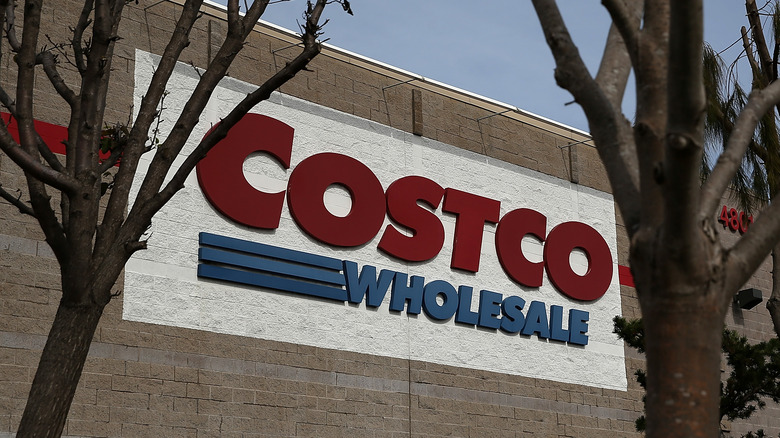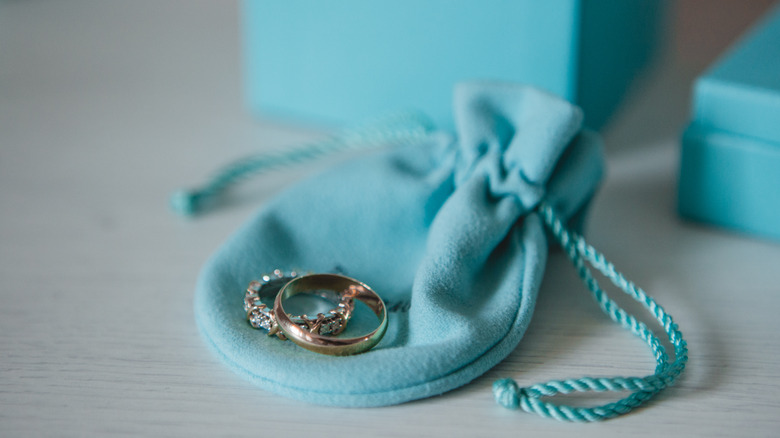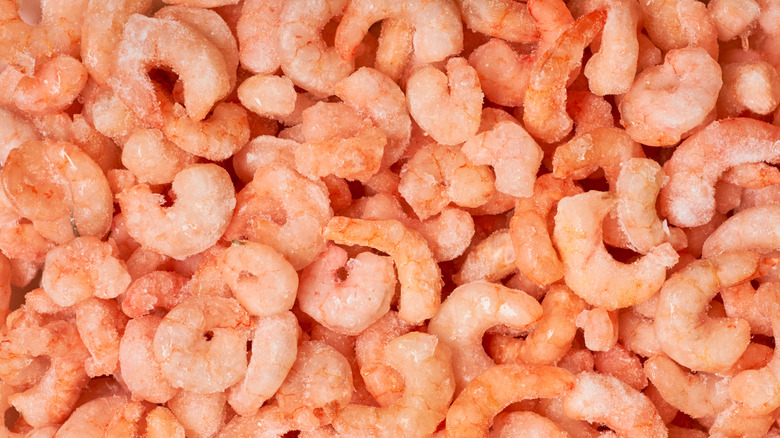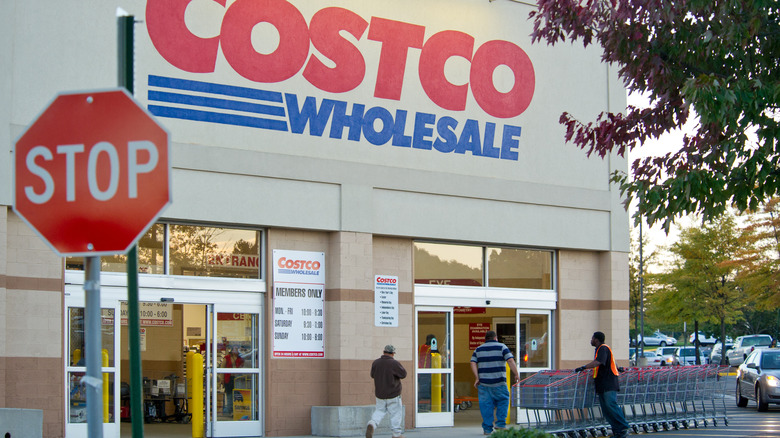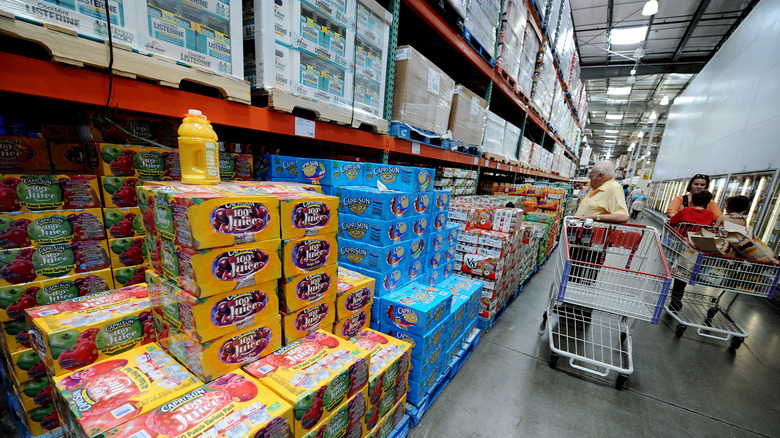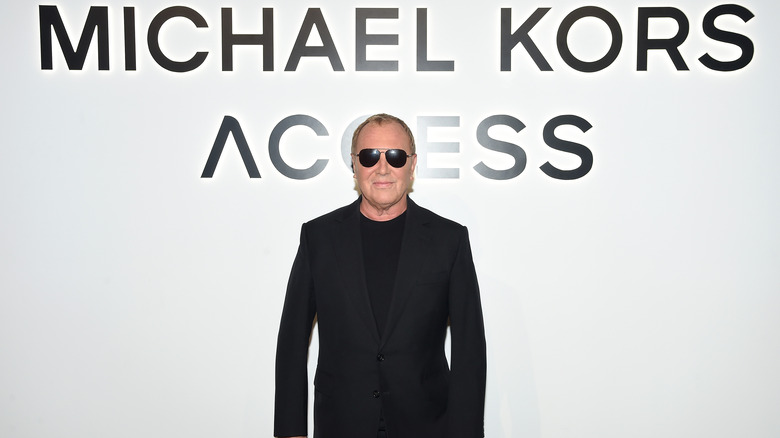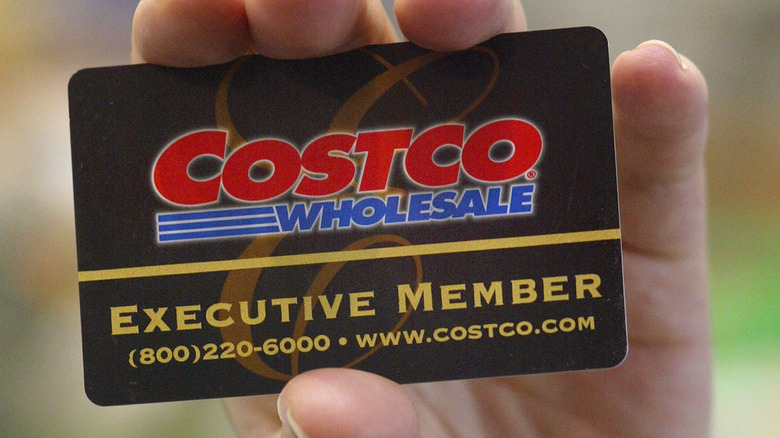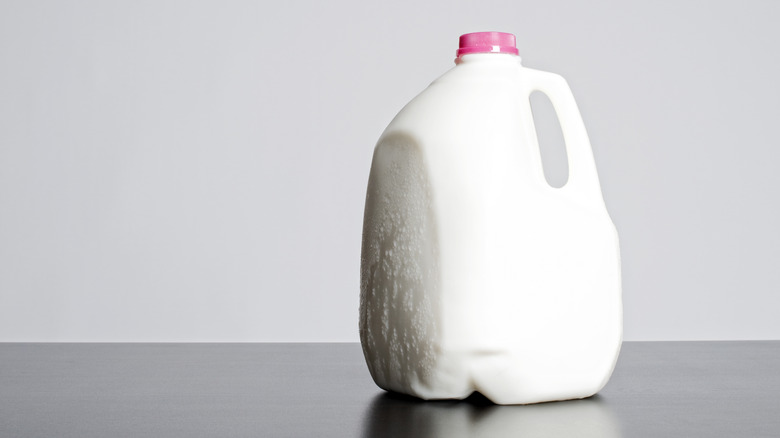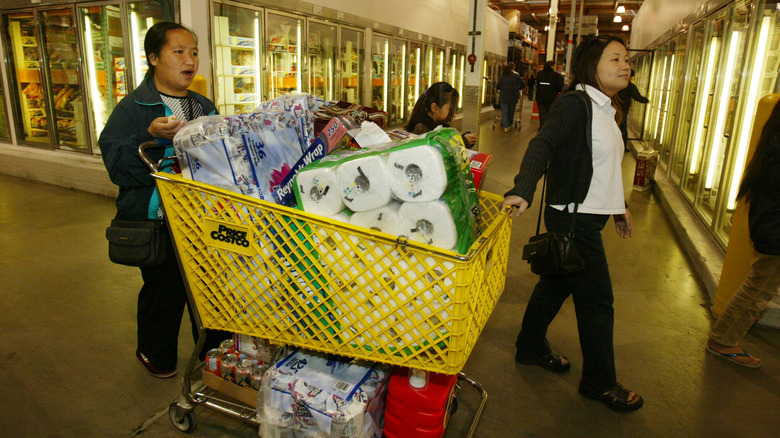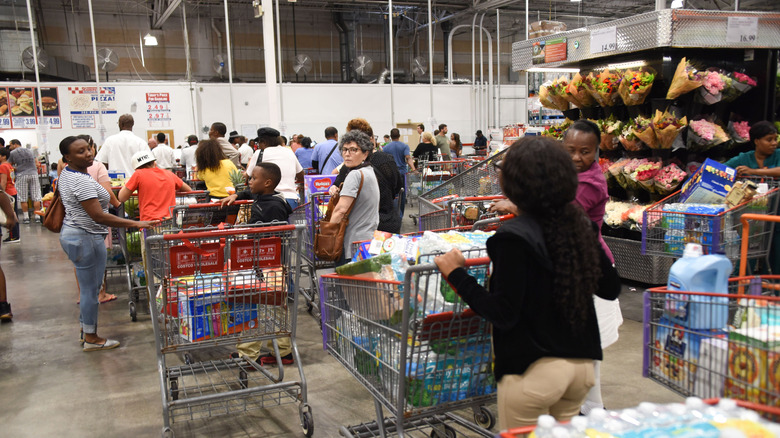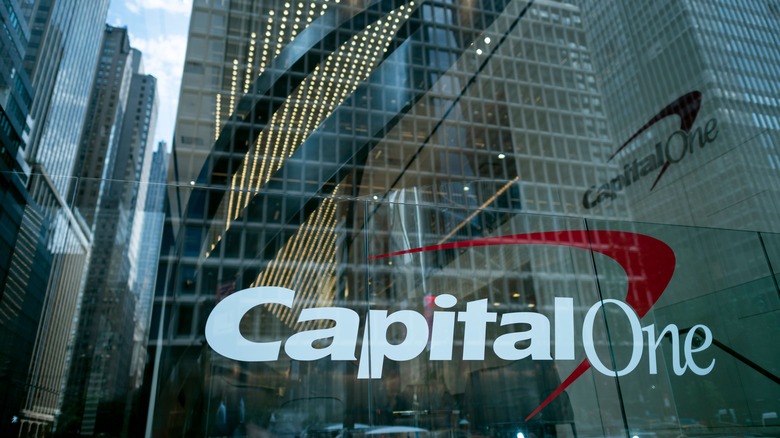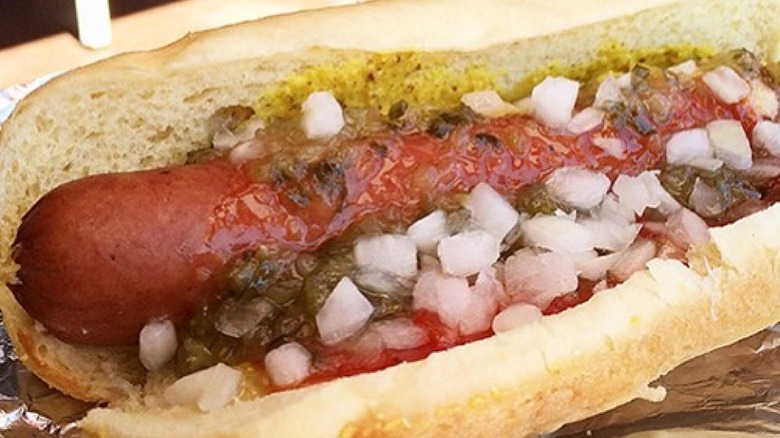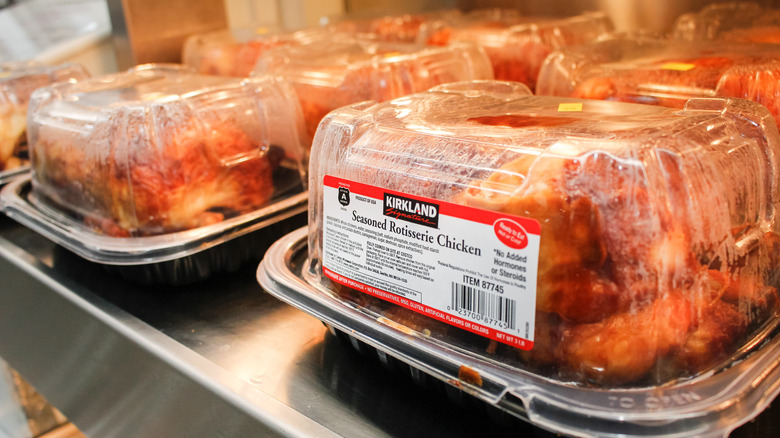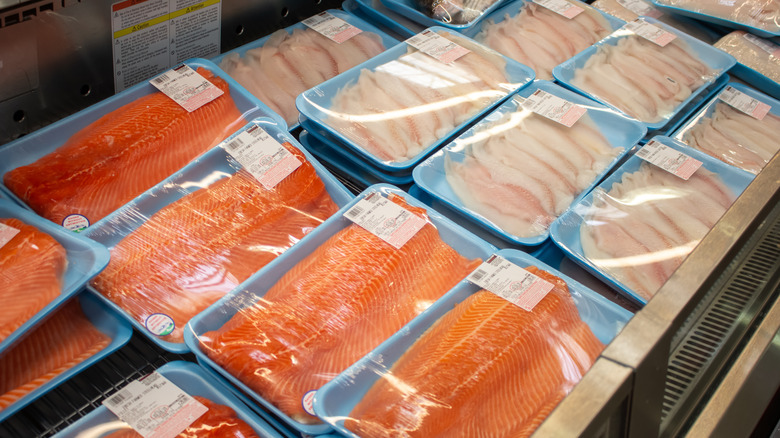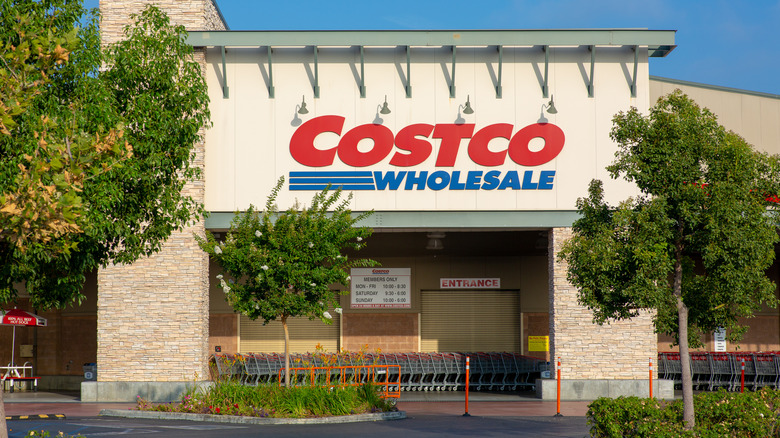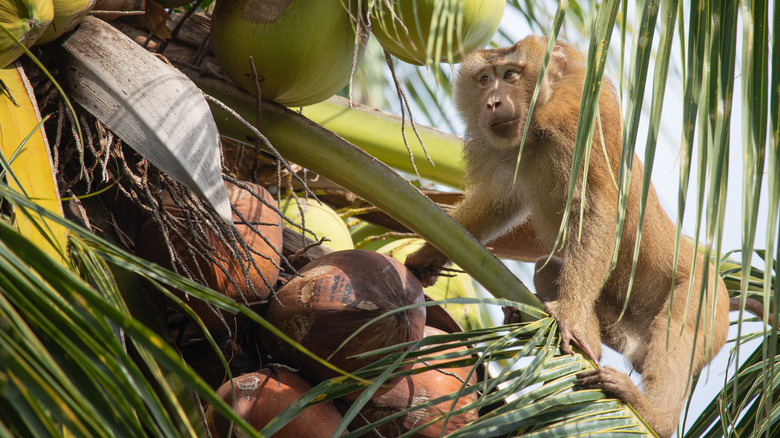The Biggest Scandals To Ever Hit Costco
At a time when many retailers are feeling the pinch caused mostly by the allure of Amazon's easy, fast, and affordable shopping, Costco continues to grow. According to CNN, it's the world's second largest retailer based on sales volume and has around 93 million members.
Costco boasts that around 90% of its members renew their memberships when they're up, and that's some pretty serious customer loyalty. In a way, that's not too surprising — Costco has some major savings on the shelves, after all — and it's hard to resist the allure of low-priced bulk packages. But in a way, it's super surprising, because the retailer's been in the news a lot — and not always for good reasons. Costco has had some pretty large-scale scandals hitting headlines. They've centered around everything from the behind-the-scenes workings of the pharmacy, to hiring practices, and hot dogs, but customers have mostly stuck with Costco through it all. It must be doing something right!
These are the biggest scandals to ever hit Costco.
Costco's drug company payments scandal
When it comes to generic drugs, some chain pharmacies will demand payments from drug companies for stocking their brand of medication. They're called "pharmacy rebates," and it means people pay more for their medicine. Thanks to these rebates, Canadians pay some of the highest drug prices in the world for generics. But in 2013, the province of Ontario made the practice illegal, hoping it would allow drug companies to charge less for generic medication and savings would get passed on to the consumer.
One salesman — Tony Gagliese of Ranbaxy Pharmaceuticals — says the practice didn't stop. His accusations — and his recorded phone call with a Costco executive who said Ranbaxy wasn't paying enough to put its drugs on the shelves — triggered a major investigation, says CBC. Costco was accused of receiving around $1.2 million CAD in illegal payments in a kickback scheme. The two Costco pharmacy execs named were fined by the Ontario College of Pharmacists, and even as the accusations turned into a provincial investigation, Costco denied any wrongdoing. It issued a formal statement saying it decided to stop giving kickbacks to pharmaceutical companies of its own accord after an internal investigation — and that the payments they did collect were actually beneficial to customers, because of the savings they could pass on.
The Ontario government didn't agree with Costco's excuses. It was fined over $7 million CAD in February 2019.
When Costco was selling fake Tiffany rings
In 2013, jewelry giant Tiffany & Co. filed a lawsuit against Costco. According to the suit, Costco's in-store signage — which identified its rings as "Tiffany" — had misled customers into thinking they were buying authentic Tiffany jewelry, when Tiffany had no agreement whatsoever with Costco.
Costco, on the other hand, claimed it was simply using the term "Tiffany" to refer to the style of the ring and not the brand. It never branded any rings, bags, or boxes with the Tiffany name or logo, didn't use the well-known blue packaging, and didn't use the name on its website — which, Tiffany added, made it easier for Costco to slip under the radar.
In 2015, a judge ruled that Costco was, indeed, guilty of trademark infringemeny. It was hit with a massive $19.3 million fine, which was later overturned. Bloomberg reported that both parties settled in 2021.
Costco faced accusations of lax pharmacy controls
In 2017, Costco agreed to pay out $11.75 million after the Department of Justice investigated allegations that it was improperly filling prescriptions. Claims included that Costco pharmacies were filling prescriptions that weren't written correctly, that didn't have the proper identifying marks, and that had been written for substances beyond what physicians could legally prescribe.
The investigation was huge, reported The Orange County Register, and by the time it was done it uncovered not just lax pharmacy controls, but problems with its record-keeping as well. US Attorney Eileen M. Decker had this to say: "These are not just administrative or paperwork violations — Costco's failure to have proper controls in place in its pharmacies likely played a role in prescription drugs reaching the black market."
Those are some serious claims, and after the investigations finished in California, Michigan, and Washington, Costco issued a statement saying it believed its actions did not put anyone at risk. In addition to the fine, it also invested $127 million in a new pharmacy management system to prevent future issues.
When Costco's shrimp was connected to slave labor
The roots of this one go back to 2014, when The Guardian launched an investigation into the shrimping industry in Thailand. The six-month investigation uncovered some dark things about CP Foods, which supplied shrimp to Costco, and also to Walmart and European chains Carrefour and Tesco. Former slaves had testified that when they paid brokers to find them work, they were instead sold to boat captains who then passed them onto companies that supplied the CP Foods food chain. There were reports that they were held captive at sea for years, witnessed beatings and executions, and were forced to work 20-hour shifts while fueled up on meth.
Some were working on ships that farmed so-called "trash fish," which were then fed to the farmed shrimp that eventually ended up on grocery store shelves.
Three law firms in California filed a lawsuit against Costco to block the sale of shrimp connected with the Asian slave trade, but the 2015 lawsuit was ultimately dismissed in 2017. It was ruled that the suit "failed to establish that the world's second largest retail chain was bound to inform customers that modern-day slavery could be part of its supply chain," reported Reuters.
Egg conditions at a Costco supplier
Hillandale Farms was supplying Costco — and other retailers — with a huge portion of their eggs, and when grisly undercover footage was released in June 2015, the public was shocked.
According to ABC News, the footage was shot by an investigator for the Humane Society of the United States. He spent three weeks working at the farms as a day laborer, and found the farm's chickens were living in horrible conditions. Cages were dirty, dead chickens dropped to the ground and stayed there so long they were mummified, and live chickens had little to no room to even move.
Hillandale disputed the footage, saying it didn't show the norm and claiming the investigator was documenting the very conditions he had been hired to clean up, and while the Humane Society did admit the video was simply a small snapshot, they also added there were a ton of red flags and that more was going on than Hillandale was saying. As for Costco, pressure on it increased to make a promise to carry only cage-free eggs, which it announced it would do in December of the same year (via Quartz).
Costco, Seth Rogen, and the American Left
Seth Rogen was stirring up social media outrage in 2017 when he took to Twitter to try to shame Costco into pulling a book from their shelves. The book was called "The Big Lie," and he tweeted: "@Costco Why do you sell books that compare left wing people like me to Nazis?"
Costco stayed mum on the whole thing, while social media was divided firmly down the middle. According to Fox News, the book's author responded with a request directed at Rogen: "...tell me what I got wrong."
Strangely, the tweet was picked up a few months after Rogen originally sent it, thanks to a media analyst named Mark Dice. Liberals and conservatives alike piled on, with some accusing Rogen of what some called very Nazi-like behavior: ie., trying to get a book banned. For his part, Rogen tweeted that he wasn't trying to get the book banned, he just wanted to know why Costco was selling it "next to tubs of yogurt." His representation, in the meantime, didn't comment on his polarizing stance.
Costco's gender bias lawsuits
In 2004, 700 female employees pointed a bright and very uncomfortable spotlight on Costco's practices of promoting from within. According to SFGate, the past and current employees said Costco had a nasty habit of passing over women when management positions opened up, as well as not advertising open positions or their qualifications.
The suit was only settled in 2013, when Costco agreed to pay out $8 million to settle the suit. There was some fine print that was also part of the lawsuit, too, and Costco would no longer be allowed to pick out employees with a "tap on the shoulder" and tell them they'd been selected for a management position — something that some former employees said had been the normal process in many stores. Going forward, all management openings would have to be posted for at least 10 days, and a system would be put in place where employees could tell their managers they were interested in moving up.
Discrimination against deaf employees at Costco
Christine D'Onofrio had worked for Costco for 24 years and at two different locations when she was fired in 2013. According to the Miami New Times, the long-time warehouse club employee — who is deaf — had asked repeatedly over a year's time that Costco help accommodate her disability and treat her fairly. The chain store only brought in an interpreter once, and that was when it told her she was fired for being "loud and aggressive."
D'Onofrio took them to court, and the trial dragged out for a shocking three years. Costco claimed she had been fired because of her temper, not her disability, and said it had installed video phones for her to use and conducted sensitivity training with her in mind. She responded that the manager who she had issues with — who mumbled and covered his mouth when speaking, making it impossible for her to read lips — had even missed the sensitivity training, and had refused her requests to write down his communications so she could understand them. She said her troubles stemmed from that management team, and that they reprimanded and even suspended her, when — for the previous 23 years — she had no complaints on her record. She was ultimately awarded $775,000.
Costco's Michael Kors bait-and-switch
Getting someone special a Michael Kors handbag at a great price from Costco might seem like a great deal, and advertisements suggesting that customers could do precisely that started popping up in 2013. The advertisements featured images of designer handbags — many of which appeared to be Michael Kors designs. Michael Kors was less thrilled than customers were, and his response involved complaints being filed in federal courts.
The designer merchant said that not only was Costco not an authorized Michael Kors retailer, but that it carried none of Kors' handbags and were instead running a bait-and-switch false advertising campaign (via Reuters). The entire point of using the Michael Kors name, it claimed, was to get customers in the door with a seemingly great deal and sell them something else when they found out the real thing wasn't on the shelves. At the time, Michael Kors was selling handbags for anywhere from $298 to $1,195, much higher than Costco's selection of handbags, which it advertised started at a price of $99.
Costco didn't immediately comment on the story when it broke, but it did settle the lawsuit in 2014 (via Law360).
Costco, supplies, and (potential) stolen goods
There's no telling what's going to show up on the shelves of Costco, and that's part of the fun of shopping there ... for customers at least. In 2009, Citizens of Humanity, LLC was less than thrilled to find some of its very, very expensive jeans for sale at Costco. The problem was complicated.
Since Citizens only had a limited number of retailers that were authorized to sell its product — and Costco definitely wasn't one of them — it claimed the only way Costco could have gotten the jeans was if they had been stolen from a legit retailer. Citizens sued, insisting Costco needed to reveal where it had gotten the jeans from and 'fess up about selling stolen goods.
Retail Consumer Products says the case went to trial and set a pretty important precedent. Not only did Costco not have to reveal its sources (it was ruled a "valuable trade secret"), but Citizens had no control over what their distributors chose to do with the jeans after they were in possession of them. If those distributors wanted to sell them to Costco, they could — much to the delight of some shoppers.
Costco's organic milk scandal
"Organic" is a pretty powerful buzzword, and anyone who vows to go as organic as possible probably takes the claims very seriously. Unfortunately for Costco, in 2017 The Washington Post did an expose of the Aurora Organic Dairy, the main supplier of not just Costco, but Walmart, too.
In order to be considered organic, milk needs to come from cows allowed to graze for the entirety of the grazing season. When investigators visited the farm, there were almost no cows out grazing. Satellite photos taken throughout the season revealed the same thing, shortcomings the dairy dismissed as anomalies.
The 2017 investigation came 10 years after the dairy had been accused of "willful violation" of the USDA's standards for organic milk, but settled and continued to operate. According to The Denver Post, the USDA did investigate the charges in 2017, but found no violations. Even though the case was officially closed, watchdog groups continued to protest what they viewed as feeble investigations and an unacceptable verdict — leaving Costco customers to wonder if their organic milk was really organic at all.
Costco's allegedly sewer-ruining toilet paper
Unfortunately for Costco, some of the scandals surrounding it seem to appear out of nowhere — and not because of anything it's done at all.
It wasn't long ago that email forwards warned recipients of dangers lurking in places you never thought of, and Facebook has made it even easier for things to go viral. In 2018, Costco shoppers were alarmed when one of those viral warnings was about Costco — or rather, its toilet paper. It was a reemergence of a story that claimed Costco's ever-popular toilet paper could have a devastating impact on septic systems. The post claimed its particular brand of toilet paper wasn't biodegradable, clogged up septic systems, blocked sewer pipes, and could eventually lead to one of your worst nightmares: a sewage backup.
Was it true? Snopes did some research, and it turns out that a post isn't made more true the more times it's shared after all. It found no concrete evidence that there was anything wrong or abnormal about Costco's toilet paper, and while it couldn't explain why the post — which had originally popped up in January 2016 — made a reappearance, it did say that the outrage was pretty unnecessary.
When a Costco employee was found guilty of wire fraud
You might not really think about it, but when you go shopping — anywhere — you're putting a huge amount of trust not only in a retailer, but in its employees as well. And retailers count on being trustworthy — it's their business on the line. When one Costco employee was convicted on fraud charges in 2018, it's no wonder that The Takeout called it "so trust-shattering, so truly egregious."
The details of the case were pretty shocking, and it centered around a former employee named Robin Cline. Cline had been with Costco for 20 years, and she had spent five of those years creating false entries into customers' business accounts then funneling the funds from credits and charges into her own account or into her son's. According to the Department of Justice, more than 100 customers had their accounts tampered with, and Cline had stolen around $290,000 from Costco and customers. They added that Costco not only condemned the act — and made it clear that she had gone above and beyond to keep the books out of the hands of other employees to keep the scam secret — but it also refunded any customers that had money stolen. As a show of good faith, it also added an extra 10% on to the refund.
Cline was sentenced to a year in jail.
When Costco was a part of one of the largest security breaches on record
In 2019, The Globe and Mail was reporting on what was one of the largest data hacks in Canada to date. Capital One was the target, and the hack compromised the data of six million people, including an undetermined number of Costco customers.
Capital One, they said, was responsible for supplying Costco's Mastercard credit cards, and the number of Canadian customers impacted was staggering. Between Costco's and the Hudson's Bay Co.'s card holders, somewhere around a million social insurance numbers were compromised (Canada's social insurance number is similar to the US's social security number).
The breach impacted customers who had applied for credit cards between 2005 and 2019, and also compromised things like phone numbers, credit scores, birth dates, and income. Costco did respond to the breach, but only to redirect all inquiries to Capital One.
Canada's Global News also reported that the hacker had been arrested only a few days following the hack, and that Capital One was offering free monitoring of accounts of anyone caught up in the breach. The effects of this one are likely to be long-lasting, and could be felt for a long, long time.
Costco customers #SaveThePolishDog
It's no secret that Costco customers love their rotisserie chickens and their hot dogs, so when the corporation announced it were going to be getting rid of its Polish dog in 2018, social media was not having any of that nonsense.
"You are ruining my life," read one tweet, while another volunteered this bit of wisdom: "'I'd rather have an acai bowl than a Polish dog', said no one with functioning taste buds."
That acai bowl was among the menu items replacing the Polish hot dog, along with plant-based protein salads and organic burgers. Even though CFO Richard Galanti assured The Seattle Times that the all-beef dog deal wasn't going away, it didn't really help for some people ... although neither did the social media movement #SaveThePolishDog.
But there are still two important footnotes to the story. Costco Canada was quick to tweet that no, it wasn't removing the Polish dog from its menu, so there's some hope for those near the Canadian border. And if you're not up north, there's still a place you can get a Polish hot dog: Today reported that Sam's Club added it to its menu after the uproar.
Costco was sued for animal mistreatment
Costco's famous $4.99 rotisserie chicken has a scandalously low price — so low the company takes a loss on the product just to bring people into the store. Unfortunately, according to a lawsuit filed in June 2022, the chicken also has an equally scandalous source.
Earlier in 2021, Costo came under fire when an investigation by animal rights group Mercy for Animals uncovered alleged animal mistreatment at the company's poultry processing plant in Nebraska. A video filmed by an undercover investigator found injured chickens crowded in a dimly lit space filled with excrement. It was grim enough that it led to an op-ed in The New York Times.
According to CNN, Costo defended its farm, claiming its chickens were housed in accordance with standards set by the National Chicken Council. That didn't stop a lawsuit from two of the company's shareholders, who alleged that the wholesale giant broke its fiduciary duties by violating animal welfare laws.
"Costco illegally neglects and abandons its chickens," the suit claimed (via CNN) adding that executives, "caused, [are] aware of, and consciously disregarded clear signs of Costco's ongoing mistreatment of chickens." According to Delish, the lawsuit also alleged that chickens were "bred to grow unnaturally fast" and impaired by large undersides that dragged on the ground.
At the time of this writing, Costco has not publicly commented on the lawsuit, but when it comes to the low price of its chicken, the goose might be cooked.
Costo's fishy $200,000 lawsuit
Gross food-related lawsuits aren't uncommon. Who could forget the infamous human finger in Wendy's chili (a hoax for the history books) and the McDonald's coffee lawsuit that was so notorious it was immortalized in an episode of "Seinfeld?" Costco isn't immune, and in 2022, the wholesaler was sued for some seriously fishy business.
According to CBS News, a family filed a $200,000 lawsuit against Costo after discovering worms — real, live creepy crawlies — in their frozen halibut. The grossest part? They only discovered it after they started eating. Yum!
Per the filing, the family purchased a package of Kirkland brand Halibut filets in March 2021. They cooked it the same day, and the parents — Dr. Vahid Berdjis and his wife Nafiseh Berdjis — ate some of the meal, sharing the leftovers with their daughter. It was then the horror unfolded as their daughter picked at her fish with a fork and a bunch of live worms allegedly crawled out. Needless to say, it caused emotional distress and put the Berdjis kids off seafood indefinitely.
At the time of this writing, the suit hasn't been resolved. It's unclear how Costco plans to worm their way out of this one.
Costco's umbrellas spark a national recall
Summer barbecues can get lit — but Costo members didn't expect their warm-weather celebrations to literally go up in flames. In June 2022, the big-box retailer recalled 400,000 solar umbrellas because they were a potential fire and burn hazard.
According to the United States Consumer Product Safety Commission, SunVilla Corporation's LED Market Umbrellas, which have been on Costco shelves since December 2020, sparked a nationwide recall after six reports of the lithium-ion batteries overheating. In three of those reports, the solar panels caught fire while the umbrella was charging indoors. In two reports, a solar panel overheated and ignited while attached to an umbrella. In the final report, someone suffered from a smoke inhalation injury. The commission urged consumers to remove the solar panel, avoid charging it with the AC adaptor, and store it in a cool, dry place away from combustible materials and sunshine.
A month prior to the recall, Costo pulled the product from shelves. Anyone who did purchase the umbrella qualifies for a full refund.
This coconut milk scandal is (coco)nuts
The coconut milk options at Costco got a little bit thinner in 2020 thanks to some serious monkey business. According to USA Today, animal rights group PETA claims the wholesalers dropped Chaokoh coconut milk when the Thailand-based company was accused of forced monkey labor. Yes, that's actually a thing.
PETA began investigating the animal abuse allegations in 2019. According to the nonprofit's corporate responsibility officer, who spoke to USA Today, the investigation found that monkeys were chained and forced to harvest as many as 400 coconuts a day, then locked in cages. The process was reportedly legal — and even allegedly promoted by Thailand's Tourism Authority.
PETA gave Costco the head's up, and the brand reportedly launched its own investigation. In a letter obtained by USA Today, Costco Vice President Ken Kimble told PETA President Ingrid Newkirk that he was concerned about the treatment of monkeys. "We have ceased purchasing from our supplier/owner of the brand Chaokoh," he wrote. "We will continue to monitor the implementation of the harvest policies and once satisfied will resume purchasing."
Costco didn't act alone. Walgreens, Food Lion, Giant Food, and Stop & Shop all dropped the product. The controversy was so fierce that Theppadungporn Coconut Co. Ltd, which produces the coconut milk, launched a third-party audit. After investigating 64 of its 817 plantations, the brand told USA Today that it found no evidence of monkey labor.
